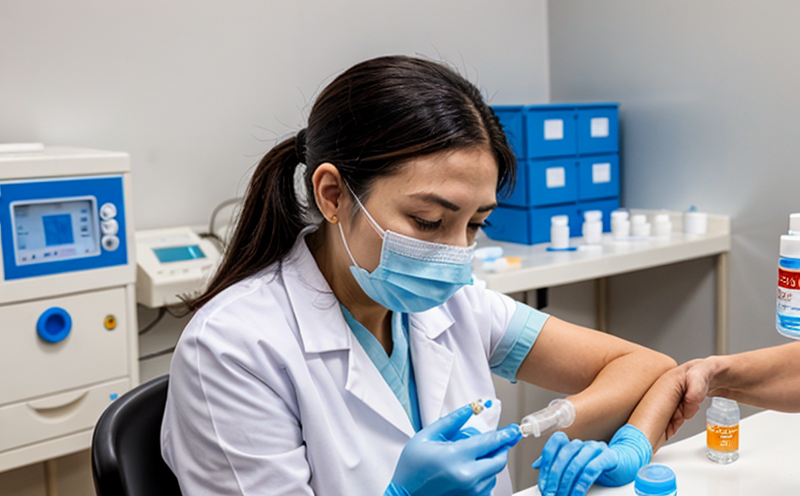ASTM F1140 Burst Strength Testing of Vaccine Seals
The ASTM F1140 standard specifies procedures for determining burst strength testing of vaccine seals. This service is critical in ensuring the integrity and quality assurance of vaccines during production, storage, and distribution.
The burst strength test evaluates the seal's ability to withstand pressure without failure. This is important because a compromised seal can lead to contamination or leakage, which would compromise the efficacy and safety of the vaccine. By adhering to ASTM F1140 standards, laboratories ensure that vaccines meet stringent quality criteria set by regulatory bodies like the FDA.
The testing process involves subjecting the vaccine seal to increasing pressure until it fails. The point at which failure occurs is recorded as the burst strength. This measurement provides critical insights into the design and manufacturing quality of the vaccine vial, helping manufacturers identify potential weaknesses that could affect product integrity.
Our laboratory adheres strictly to ASTM F1140 guidelines ensuring accurate results and consistent compliance across multiple batches and production runs. The test is conducted under controlled conditions to simulate real-world storage and transport scenarios where vaccines are exposed to varying pressures.
The equipment used for this testing includes specialized hydraulic presses capable of generating precise, measurable pressure on the vaccine seal. This ensures that each measurement is reliable and repeatable, which is essential in maintaining high standards of quality assurance.
Following the test, the results are meticulously recorded and reviewed to ensure compliance with ASTM F1140 requirements. These findings inform necessary adjustments to the manufacturing process to enhance product integrity further.
Why It Matters
The significance of ASTM F1140 burst strength testing cannot be overstated in the pharmaceutical industry, particularly for vaccines. Ensuring that vaccine seals meet the required standards is crucial not only from a quality assurance perspective but also from a safety standpoint.
- Prevent Contamination: A compromised seal can allow contaminants to enter the vaccine vial, compromising its efficacy and potentially causing health risks.
- Maintain Efficacy: Properly sealed vaccine vials ensure that the product remains stable under various storage conditions, maintaining its effectiveness throughout its shelf life.
- Regulatory Compliance: Adhering to ASTM F1140 ensures compliance with international standards set by regulatory bodies such as the FDA. This is essential for obtaining and maintaining approval for vaccine distribution.
- Enhanced Consumer Trust: Demonstrating adherence to rigorous testing protocols builds trust in the pharmaceutical industry, ensuring that consumers have confidence in the safety and quality of the vaccines they receive.
The results of these tests are pivotal in ensuring that vaccines remain safe and effective throughout their lifecycle. By incorporating ASTM F1140 burst strength testing into your quality assurance processes, you can ensure that your products meet the highest standards of integrity and reliability.
Benefits
The benefits of implementing ASTM F1140 burst strength testing are manifold. This service provides a robust framework for ensuring vaccine quality and integrity throughout production, storage, and distribution.
- Enhanced Product Integrity: By identifying potential weaknesses in the vaccine seal through rigorous testing, manufacturers can make necessary adjustments to improve product design and manufacturing processes.
- Increased Safety: Ensuring that vaccine seals are robust and resistant to pressure helps prevent contamination and maintains the safety of the product during transportation and storage.
- Regulatory Approval: Compliance with ASTM F1140 is essential for obtaining and maintaining regulatory approval, which is crucial for market access in various countries.
- Increased Consumer Confidence: Demonstrating a commitment to quality through rigorous testing protocols enhances consumer confidence, contributing positively to brand reputation.
- Cost Efficiency: Early identification of potential issues during the manufacturing process can prevent costly recalls and rework, ultimately saving time and resources.
- Improved Traceability: Detailed records from ASTM F1140 testing provide a clear history of production quality, aiding in traceability and accountability throughout the supply chain.
The implementation of this service not only ensures that vaccines meet stringent international standards but also contributes to the overall safety and efficacy of pharmaceutical products. By leveraging this service, manufacturers can uphold their commitment to excellence and reliability in the industry.
Industry Applications
| Application | Description |
|---|---|
| Vaccine Manufacturing | Detecting potential weaknesses in vaccine seals to ensure product integrity and safety during manufacturing. |
| Vaccine Storage & Distribution | Evaluating the robustness of vaccine seals under various pressure conditions encountered during storage and transport. |
| Regulatory Compliance | Ensuring adherence to international standards set by regulatory bodies for quality assurance. |
| Quality Control | Maintaining consistent product quality across multiple batches through rigorous testing protocols. |
- Vaccine Manufacturing: Identifying potential weaknesses in the design of vaccine seals to ensure they are robust and resistant to pressure, thereby preventing contamination during manufacturing.
- Vaccine Storage & Distribution: Evaluating the seal's ability to withstand varying pressures encountered during storage and transport, ensuring product integrity.
- Regulatory Compliance: Ensuring that vaccine seals meet international standards set by regulatory bodies such as the FDA for quality assurance.
- Quality Control: Maintaining consistent product quality across multiple batches through rigorous testing protocols to ensure reliability and safety.
The ASTM F1140 burst strength test is a vital tool in safeguarding vaccine integrity, ensuring that these critical pharmaceutical products meet the highest standards of quality and safety. By incorporating this service into your production processes, you can enhance the reliability and trustworthiness of your vaccines.





